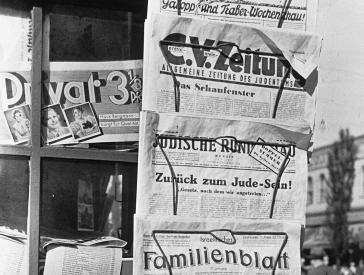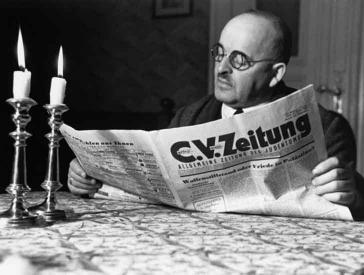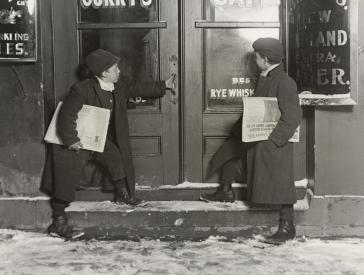Cultural Program in November 2014
Press Invitation
Press Release, Tue 28 Oct 2014
We herewith invite you to the cultural program at the Jewish Museum Berlin in November 2014.
Special exhibition and accompanying program
24 October 2014 to 1 March 2015
Snip it! Stances on Ritual Circumcision
"Snip It!" takes a careful look at the diversity of stances on the ritual circumcision of boys. Incisive in every sense of the term, the exhibition explores ritual circumcision as such, but also reflects a sense among many Jews and Muslims that they and their religious traditions are not welcome in Germany. Against this backdrop, the Jewish Museum Berlin examines the little-known religious, cultural, and historical contexts of a ritual that goes back thousands of years, addressing circumcision in Judaism and Islam and its reception in the Christian world.
Starting from the Jewish concept of the Abrahamic covenant, which is sealed with a bodily sign, "Snip it!" illuminates circumcision from the perspective of the three monotheistic religions: from its roots in the ancient Orient, via the circumcision of Christ, right up to elements of popular culture with US television series.
The Jewish Museum Berlin's exhibition was prompted by a fierce controversy that arose in May 2012, when a regional court in Cologne declared the ritual circumcision of boys to be a "bodily injury". In the discussions that ensued, labeled the "circumcision debate", the right to the free practice of religion was confronted with the child's right to physical integrity.
The exhibition does not enter into this debate, nor does it pursue it further. Instead, more than sixty objects and artworks from international collections provide insights into the context of the ritual. The exhibition does not shy away from documenting both anti-Semitic and islamophobic stances. It confronts visitors with the Western, "enlightened" view of Europeans onto societies that practice circumcision.
The exhibition begins with the large-scale installation "On the Knife's Edge", featuring sculptures from different epochs and regions on the theme of the body and how it is shaped by culture. In the "Echo Chamber" at the end of the exhibition, film clips comment on this controversial topic - sometimes seriously, sometimes ironically. The clips include footage of the German Federal Parliament debate on the circumcision of male minors; documentaries; feature films; and contemporary TV series from Germany and the United States.
Location: Old Building, first level
Admission: with the museum ticket (8 €, reduced rate 3 Euros)
Public Tours: Sundays, 2 pm (3 € plus museum ticket)
10 November
Monday Movies
"Circoncision"
France 2000, directed by Nurith Aviv, 52 min., French with German subtitles
Which role is played by the decision for or against circumcision in secular life? In her documentary, Nurith Aviv gives a voice to parents from different cultures who have considered this question. Through discussions about belonging, tradition, and family loyalty, a surprising panorama evolves that time and again frames anew the significance of cultural tradition in a non-religious life.
The film director will attend.
Location: Old Building, ground level, Auditorium
Time: 7.30 pm
Admission: free
- Kontakt
-
Press office
T +49 (0)30 259 93 419
presse@jmberlin.de
- Address
Jewish Museum Berlin Foundation
Lindenstraße 9–14
10969 Berlin
Academy Programs Migration and Diversity
6 November
What belongs together is now growing together? 25 years since the fall of the Wall from a minority perspective (Jetzt wächst zusammen, was zusammen gehört?)
Film, lecture and panel discussion
The fall of the Berlin Wall and the process of German reunification are anchored in the majority society’s collective memory as an expression of a "peaceful revolution". But how did members of minorities in East and West experience this historic revolution and the subsequent events which included racist pogroms like in Rostock-Lichtenhagen or Mölln? Where did they see their place in this historical moment of the "reinvention of the nation" and did their communities also go through a process of growing together?
Location: Academy, Hall
Time:
5 pm: Film "Duvarlar-Mauern-Walls" (directed by: Can Candan, USA/Turkey 2000, 83 min., Turkish/English/German with German subtitles)
7 pm Lecture by Dr. Patrice Poutrus (University of Vienna)
Afterwards: Panel discussion with representatives and experts from various minority communities.
Admission: free
Bookings are requested on tel. +49(0)30 25993 488 or reservierung@jmberlin.de
27/28 November
Media and Minorities. Questions of representation in international comparison
International Conference (German/English with simultaneous interpretation)
Many members of the majority population gain their knowledge of minorities, migration, and integration primarily from the media. But which images are communicated there and what impact do they have? At the conference, the latest results of research on media representation of minorities in Germany, the USA, Great Britain, and Canada are presented and discussed. The conference also questions whether a higher proportion of minorities in media production automatically leads to greater balance in dealing with these issues, and which strategies exist for a more inclusive media landscape in immigration societies.
Location: Academy, Hall
Time: 27 November: 9.30 am to 6 pm, 28 November: 9.30 am to 4.30 pm
Admission free
Reading, Conferences, Talks
2 November
Masel tov, Warshe!
Panel discussion and concert (in Polish with simultaneous interpretation into German)
On 28 October 2014, the permanent collection of the Museum of the History of Polish Jews in Warsaw will be opened. The Jewish Museum Berlin and the Polish Institute Berlin are celebrating this event with a panel discussion on contemporary Jewish life in Poland with Dr. Dariusz Stola, director of the Warsaw Museum, writer and author Katka Reszke, and musician Raphael Rogiński. The Shofar Trio will play "Nigune" – magical Jewish liturgical songs – and cheerful dance tunes.
A cooperation with the Polish Institute Berlin, the Association for the Promotion of the Museum for Jewish History in Poland, and the German-Polish Cooperation Foundation
Location: Old Building, ground level, Glass Courtyard
Time: 4.30 pm
Admission: free
Bookings are requested on tel. +49(0)30 25993 488 or reservierung@jmberlin.de
13/14 November
"Shaping Access! More Responsibility for Cultural Heritage"
Conference
Digitization has made access to cultural heritage far easier in recent years. How are museums, archives, and libraries handling the digital revolution? The fourth international conference "Shaping Access! More Responsibility for Cultural Heritage" will reflect on the status quo of digitization in Germany. What has happened so far, which digitization projects have been realized and have led to sustainable results, which problems have been encountered, which efforts have failed?
The conference is headed by Dr. Paul Klimpel and supported by the Prussian Cultural Heritage Foundation, DigiS – Service Center Digitization Berlin, the German Digital Library, the Internet & Society Co:llaboratory, iRights.info, the Jewish Museum Berlin, the Berlin Museum of Natural History, the Network of Multimedia Resource Centres, the Open Knowledge Foundation Germany, the House of the History of the Republic of Germany Foundation, the Foundation for Historical Museums in Hamburg, and Wikimedia Germany.
Location: "Hamburger Bahnhof – Museum für Gegenwart ", Invalidenstr. 50-51, 10557 Berlin
Admission: free
14 November
Online Access to Jewish Cultural Assets
The Jewish Museum Berlin's panel discussion as part of the "Shaping Access" conference
In the years between 1933 and 1945, Jewish cultural assets in the occupied countries of Europe were systematically robbed and destroyed. Today the ritual objects are not usually in the possession of the descendants and legal heirs, but are scattered around the world. Access to Jewish heritage is coupled with political and ethical questions. Against this backdrop, the panel presents the online strategies of major institutions in Germany, Eastern Europe, and Israel and reflects the considerations underlying the various approaches.
Panel: Dr. Haim Gertner (Head of the Holocaust Memorial Archive, Yad Vashem), Dr. Rachel Heuberger (Head of the Judaica Collection at the University Library at the Goethe University in Frankfurt/Main), Aubrey Pomerance (Head of the Jewish Museum Berlin Archive and the Leo Baeck Institute Berlin), Albert Stankowski (Head of the Digital Collection, Museum of the History of Polish Jews)
Moderated by Dr. Mirjam Wenzel (Head of the Media Department at the Jewish Museum Berlin)
Location: “Hamburger Bahnhof – Museum für Gegenwart ” Invalidenstr. 50-51, 10557 Berlin
Time: 10 am
Admission: free
14 November
What’s your "Heimat"?
Conversation with Monika Grütters and W. Michael Blumenthal about culture, religion, and home in a foreign land
Home can be many things. The American W. Michael Blumenthal, long-standing director of the Jewish Museum Berlin, was driven out of Berlin as a child, in the USA he rose to the position of Treasury Secretary. He still loves Ku’damm and "Königsberger Klopse". Monika Grütters, Berliner by choice, who has been German Minister for Cultural Affairs at the chancellery for one year, brought her Catholicism with her from Westphalian Münster to the secular capital. Which part is played by religion in home and identity? What is the role of culture in an integration society? Blumenthal and Grütters – who have been friends for years – will discuss these themes.
Moderated by Volker Resing
A cooperation with the Catholic Academy Berlin and Herder Publishers
Location: Old Building, ground level, Glass Courtyard
Time: 7 pm
Admission: free
Bookings are requested on tel. +49(0)30 25993 488 or reservierung@jmberlin.de
24 November
Lorenz S. Beckhardt: "The Jew with the swastika. My German family"
(Der Jude mit dem Hakenkreuz. Meine deutsche Familie)
Reading with the author
The story of an unusual German-Jewish family – from upcoming merchants in the 19th century to grandfather Fritz Beckhardt, ardent patriot and brave pilot in World War I, to the generation that ventures to start afresh in the country of the perpetrators after 1945.
The author Lorenz S. Beckhardt (born in 1961), educated at a Catholic boarding school, discovers only at the age of eighteen that he is a Jew. Gradually, he learns about the lives of his ancestors. Beckhardt movingly describes his self-discovery, the consequences of keeping silent, repression, the difficult new beginning at the old home place, and the grueling dispute over the restitution of property.
A cooperation with Aufbau Publishers
Location: Old Building, ground level, Auditorium
Time: 7.30 pm
Admission: free
Bookings are requested on tel. +49(0)30 25993 488 or reservierung@jmberlin.de




